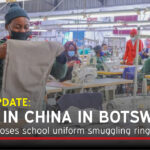Botswana Investment and Trade Centre (BITC) Chief Executive Officer (CEO) Keletsositse Olebile says Botswana’s strict laws contribute to the lower number of the International Financial Services Centre (IFSC) accredited companies.
He was speaking during a media engagement this Tuesday, where he explained that Botswana has to comply with Organisation for Economic Cooperation and Development (OECD) guidelines.
Olebile revealed that currently, Botswana has 51 registered IFSC companies, a number that once stood at over 100.
Explaining the reason for the drop, Olebile said in complying with the OECD – an international organisation that works to build better policies for better lives – BITC insists on what is called ‘substantive presence’.
“In other words, you don’t register what is called brass plate companies, where you register a company and leave it under the care of probably Deloitte or KPMG and come only once a year to hold an Annual General Meeting or a board meeting,” stressed Olebile.
He further explained that Botswana’s IFSC regime is called a ‘center of substance’, which means company premises should be in place, complete with employees and all the necessary structures.
“So, that, in essence, has not attracted the sort of numbers that you would elsewhere. But if we could relax and say you can just register brass plate, go wherever you earn, no substantive activities, then you might see the number elevating,” clarified Olebile, adding that of the 51 registered companies only 23 are operational, with the other 28 licensed but still in the process of setting up.
“Usually our standard is that if you don’t set up in 12 months, we terminate. But in conducting our annual surveys, we believe there are compelling business circumstances why a company hasn’t yet started and we tend to understand that,” he noted.
Currently, companies accredited under the IFSC certification include Letshego, Choppies, Afinitas, Seed Co., RDC Properties, Sefalana, and Motovac among others.
“This regime tends to benefit those that we have attracted from outside as well as indigenous companies,” he said.
For a company to be registered as an IFSC company, Olebile said there is an accreditation process that has to be followed, with the accreditation powers lying with the Finance Ministry.
IFSC registered companies in Botswana enjoy benefits such as being exempt from the Corporate Gains Tax where citizen ownership exceeds 25 percent and exempt from withholding tax when distributing to non-residents.
Companies registered under the IFSC also pay 15 percent in corporate tax as opposed to 22 percent paid by non-IFSC companies.
Meanwhile, Olebile said there are many benefits that Botswana can enjoy from the IFSC.
One of the benefits he highlighted is that as much as these companies make their earnings from outside the country, for the procurement processes they do it locally, which will benefit the Botswana economy.
“One of the most important things is to generate tax for Botswana because as I said, most of their earnings come from outside,” said Olebile.
















